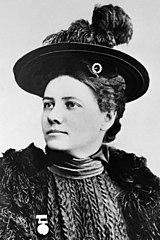Investigative journalists have helped to create social and political change throughout history from improving worker conditions in the early 1900s (the early muckrakers’ work of Ida Tarbell, Ida B. Wells, Upton Sinclair, and others) to releasing the Pentagon Papers (Daniel Ellsberg; 1971), exposing sexual harassment in the 2010s (#MeToo), and uncovering the workings of the January 6, 2021 Insurrection at the U.S. Capitol.
 Nellie Bly by Unknown author | public domain
Nellie Bly by Unknown author | public domain
You can go here to learn more about investigative journalists, past and present, including Nellie Bly (hailed by many as the first investigative reporter), Rachel Carson, and current examples such as the Pandora Papers and the Facebook Files.
Given journalism's potential to affect social change, what contemporary issues would you investigate?



 Watch on YouTube
Watch on YouTube
In this activity, you will act as an investigative journalist as you explore a political topic of interest.
Activity: Investigate an Issue
- Partner up with a classmate and select one political issue of interest to you both.
- Then, on your own:
- Interview at least three credible sources that you think will provide valuable information about the issue.
- Conduct additional research, including evaluating online sources, reviewing government documents (e.g., proposed laws), and exploring historical artifacts (e.g., supreme court case transcripts), to expand your understanding of the issue. Make sure to evaluate the credibility and accuracy of the information that you find.
- Create a 1-2 minute video presenting your findings about the topic.
- The video should establish four key things to the viewer: 1) Why the topic matters, 2) Why the topic is important to you, 3) What key information the audience needs to know about it (taken from your sources), and 4) What social action you recommend to help address the issue.
- Finally, watch your partner's video about the same topic and discuss how the media can provide competing information and views about government and politics.
Designing for Learning: Student-Created Activity Example
Investigate an Issue by Kate Horgan and Elayna Imbrogna (Laney)
Additional Resources:
Connecting to the Standards
- Massachusetts Civics & Government Standards
- Give examples of how a free press can provide competing information and views about government and politics. (Massachusetts Curriculum Framework for History and Social Studies) [8.T7.2]
- ISTE Standards
- Knowledge Constructor
- 3a: Students plan and employ effective research strategies to locate information and other resources for their intellectual or creative pursuits.
- 3b: Students evaluate the accuracy, perspective, credibility and relevance of information, media, data, or other resources.
- 3d: Students build knowledge by actively exploring real-world issues and problems, developing ideas and theories and pursuing answers and solutions.
- Creative Communicator
- 6b: Students create original works or responsibly repurpose or remix digital resources into new creations.
- 6d: Students publish or present content that customizes the message and medium for the intended audiences.
- Global Collaborator
- 7b. Students use collaborative technologies to work with others, including peers, experts or community members, to examine issues and problems from multiple viewpoints.
- 7d. Students explore local and global issues and use collaborative technologies to work with others to investigate solutions.
- DLCS Standards
- Ethics and Laws (CAS.b)
- Interpersonal and Societal Impact (CAS.c)
- Digital Tools (DTC.a)
- Collaboration and Communication (DTC.b)
- Research (DTC.c)
- English Language Arts > History/Social Studies Common Core Standards
- CCSS.ELA-LITERACY.RH.6-8.6
- CCSS.ELA-LITERACY.RH.6-8.7
- CCSS.ELA-LITERACY.RH.6-8.8
- CCSS.ELA-LITERACY.RH.6-8.9
- CCSS.ELA-LITERACY.RH.9-10.6
- CCSS.ELA-LITERACY.RH.9-10.8
- CCSS.ELA-LITERACY.RH.9-10.9
- CCSS.ELA-LITERACY.RH.11-12.6
- CCSS.ELA-LITERACY.RH.11-12.7
- CCSS.ELA-LITERACY.RH.11-12.8
- CCSS.ELA-LITERACY.RH.11-12.9